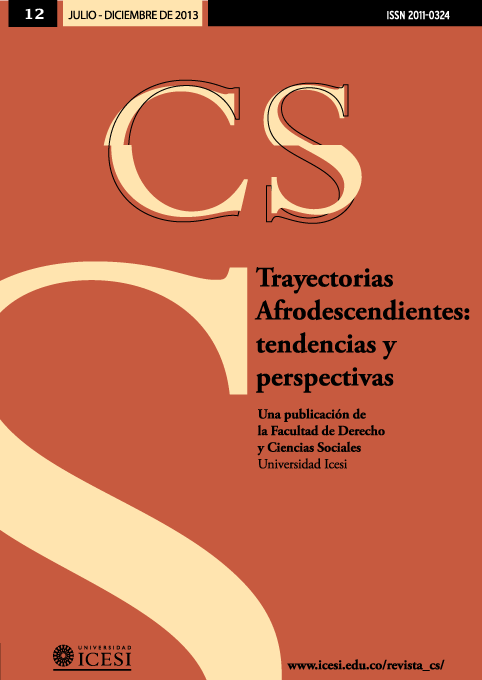Discursive Contradictions in Processes of Differentiated Social Intervention for Black Diversity in Social Programs in Colombia
DOI:
https://doi.org/10.18046/recs.i12.1676Keywords:
Cultural Diversity, Post Social State, Programs to Combat Poverty, Social InterventionAbstract
This article highlights the discursive contradictions present in state social interventions linked to social action when referring to socially vulnerable and/or impoverished Black and indigenous people. Firstly, it will analyze the discourses of those intervening about the proposals for the implementation of mechanisms of preferential access or of ethnoracial exclusivity of beneficiaries in programs to combat poverty. Secondly, it will explore their epistemic resistance to the incorporation of 'racial group' or 'skin color' as selection criteria. In doing so, the article aims to propose that institutions of social well–being need to transform and that social services should adapt to the demands of cultural diversity, adopting both new professional practices and renewed structures of meaning that facilitate the transition to nation as imagined in the Constitution.
Downloads
References
Dos Santos, G. A. (2004). Mulher Negra, Homen Branco. Río de Janeiro, Brasil: Pallas.
Lorente Molina, B. (Ed.). (2011). Transformaciones del Estado Social. Perspectivas sobre la intervención social en Iberoamérica. Buenos Aires, Argentina: Miño y Dávila Editores.
Guillaumin, C. (1992). Une société en ordre. De quelques unes des formes de l'idéologie raciste. Sociologie et Société, 24 (2), 13–23.
Mosquera Rosero–Labbé, C. y León Díaz, R. E. (2009). Entre ciudadanía abstracta y universal y ciudadanía diferenciada étnico–racial negra. Escenarios posibles para su reconocimiento. En C. Mosquera Rosero–Labbé y R. E. León Díaz (Eds.), Acciones Afirmativas y ciudadanía diferenciada étnico–racial negra, afrocolombiana, palenquera y raizal. Entre Bicentenarios de las Independencias y Constitución de 1991. Bogotá, Colombia: Universidad Nacional de Colombia.
Mosquera Rosero–Labbé, C. (2010). La persistencia de los efectos de la 'raza', de los racismos y de la discriminación racial: obstáculos para la ciudadanía de personas y pueblos negros. En C. Mosquera Rosero–Labbé, A. Laó– Montes y C. Garavito Rodríguez (Eds.), Debates sobre ciudadanía y políticas raciales en las Américas Negras (pp. 17–108). Bogotá, Colombia: Universidad del Valle, Universidad Nacional de Colombia.
Mosquera Rosero–Labbé, C. (2010). Prejuicios, incomprensiones culturales y aperturas cognoscitivas en la atención psicosocial a personas negras y afrocolombianas desterradas por el conflicto armado interno colombiano. En C. Mosquera Rosero–Labbé, B. Lorente Molina y M. J. Martínez (Eds.), Intervención social, cultura y ética: un debate interdisciplinario (pp. 285–328). Bogotá, Colombia: Universidad Nacional de Colombia.
Parizeau, M. H. y Kash, S. (2006a). Introduction. En Parizeau y Kash. (2006b). Néoracisme et dérives génétiques''. Les Presses de l'Université Laval.
Porras, A. J. (1988). Introducción a una teoría del Estado Postsocial. Barcelona, España: PPU.
Segato, R. L. (2007). La Nación y sus Otros. Raza, etnicidad y diversidad religiosa en tiempos de Política de la Identidad. Buenos Aires, Argentina: Prometeo.
Taylor, C. (1994). La ética de la autenticidad. Barcelona, España: Paidós Ibérica.
Taylor, C. (2005.). La libertad de los modernos. Buenos Aires, Argentina: Amorrortu.
Zambrano, C. V. (2006). Ejes políticos de la diversidad cultural. Bogotá, Colombia: Siglo De Hombre Editores, Universidad Nacional.
Zambrano, C. V. (2011). Fenómenos políticos culturales emergentes y fortalecimiento de servicios sociales. En B. Lorente Molina (Ed.), Transformaciones del Estado Social. Perspectivas sobre la intervención social en Iberoamérica (pp. 141–167). Buenos Aires, Argentina: Miño y Dávila Editores.
Downloads
Published
Issue
Section
License
Copyright (c) 2013 Claudia Mosquera Rosero-Labbe, Ruby Esther León Díaz

This work is licensed under a Creative Commons Attribution-NonCommercial 4.0 International License.
© Reserved Copyright
Material in this publication may be reproduced without authorization, provided the title, author and institutional source is acknowledged.
The content published in Revista CS is distributed under the Creative Commons BY-NC 4.0 Attribution/Recognition-NonCommercial 4.0 International license.
You are free to:
Share — copy and redistribute the material in any medium or format.
Adapt — remix, transform, and build upon the material.
Under the following terms:
Attribution — You must give appropriate credit , provide a link to the license, and indicate if changes were made . You may do so in any reasonable manner, but not in any way that suggests the licensor endorses you or your use.
NonCommercial — You may not use the material for commercial purposes.












